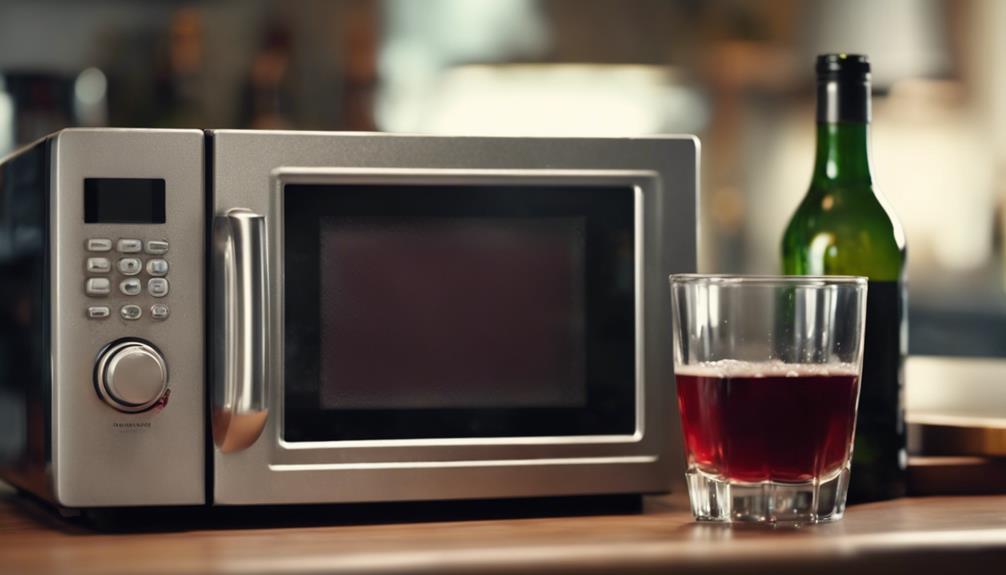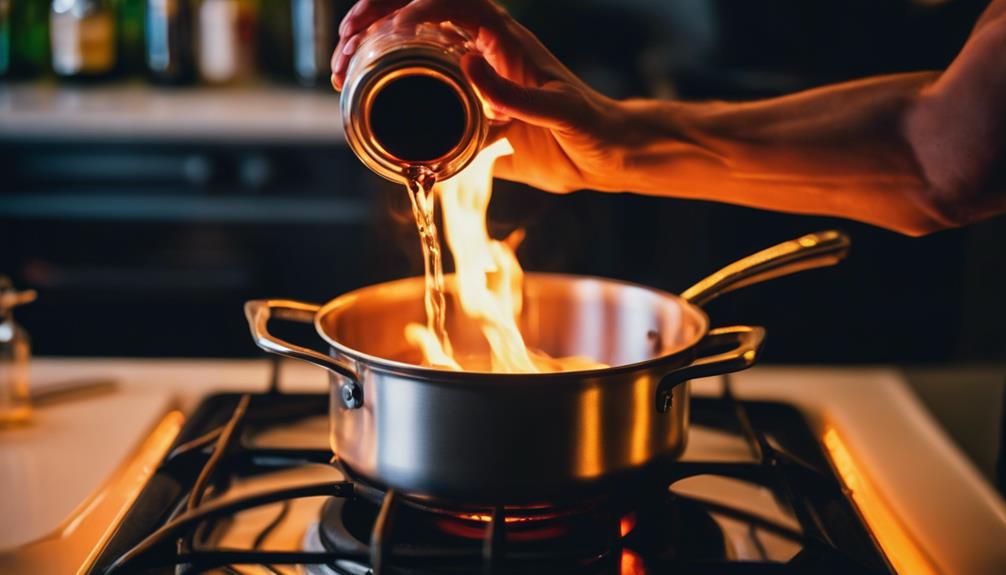Can You Microwave Alcohol
No, it is not safe to microwave alcohol. Alcohol is flammable, and heating it in a microwave can lead to combustion and potential hazards.
It is important to exercise caution and avoid microwaving alcohol to prevent any accidents or risks associated with its flammable properties.
Key Takeaways
- Microwaving alcohol poses risks like combustion and explosions.
- Ethanol is the primary alcohol suitable for microwaving.
- Heating alcohol alters its chemical composition and flavor.
- Safety precautions, like using glass containers, are crucial when microwaving alcohol.
Safety Concerns of Microwaving Alcohol
When considering the safety concerns associated with microwaving alcohol, it is crucial to acknowledge the potential risks posed by its flammable nature and the possibility of combustion and explosions.
Alcohol is highly flammable, and when overheated in a microwave, it can ignite, leading to fires and hazardous situations. Moreover, the pressure buildup from microwaving alcohol can result in container explosions, further highlighting the safety hazards involved.
Due to these risks, some regions have implemented regulations against microwaving alcohol to prevent accidents and ensure public safety. It is essential for individuals to be aware of these safety concerns and take necessary precautions when handling alcohol in microwaves to avoid potential disasters.
Effects of Heating Alcohol in Microwave
Heating alcohol in the microwave can result in chemical changes that affect its flavor and safety. Understanding how alcohol properties may transform during heating is crucial for safe consumption.
Exploring the impact of microwave heating on alcohol safety and flavor is essential for responsible handling.
Microwave Alcohol Safety
With the convenience of microwave ovens, it is important to understand the potential risks associated with heating alcohol in this manner. Microwaving alcohol carries safety risks such as combustion and explosions if overheated. To minimize these dangers, it is advisable to use glass containers and heat small amounts for short periods, ensuring to stir in between.
Different types of alcohol like ethanol, methanol, and isopropyl alcohol pose varying risks when heated. Safer alternatives for heating alcohol include stove tops, double boilers, hot water baths, slow cookers, and electric kettles.
Proper storage in airtight containers and caution during reheating can help maintain the flavor and safety of alcoholic beverages.
Chemical Changes in Alcohol
Altering the chemical composition of alcohol through microwave heating can result in significant changes to its properties and characteristics. When microwaving alcohol, its low boiling point can lead to rapid evaporation, impacting its flavor and aroma.
Heating alcohol in a sealed container poses safety risks, including dangerous explosions due to pressure build-up. The primary alcohol in beverages, ethanol, boils at around 78.37°C, affecting its heating behavior in the microwave.
These alterations in the alcohol's chemical structure can not only impact its taste profile but also pose potential hazards. Therefore, caution should be exercised when considering microwaving alcohol to prevent accidents and ensure safety.
Types of Alcohol Suitable for Microwaving

Ethanol is commonly recognized as the primary type of alcohol suitable for microwaving due to its safety and properties. When microwaving alcohol, it is crucial to use pure alcohol to avoid any unwanted reactions.
The presence of water in alcoholic beverages can affect the vapor pressure and heating behavior in a microwave oven, making pure ethanol the preferred choice. Glass containers are recommended for microwaving alcohol as they are less likely to react to the heat compared to other materials.
To prevent overheating and potential hazards, it is advisable to heat small amounts of alcohol for short periods, typically not exceeding 30 seconds. Methanol and isopropyl alcohol are best avoided due to safety risks and potential alterations in flavor when heated.
Tips for Safely Microwaving Alcohol
For the safe microwaving of alcohol, it is advisable to utilize glass containers to prevent any adverse reactions with other materials.
When microwaving alcohol, consider the following tips for a safe experience:
- Opt for sealed containers like mason jars or coffee mugs with secure lids to avoid spills.
- Heat small amounts of alcohol for short periods, with a maximum of 30 seconds, to prevent overheating.
- Stir between heating intervals to ensure even distribution of heat throughout the alcohol.
- Never leave the alcohol unattended while microwaving and check on it regularly for safety.
Alternatives to Microwaving Alcohol

When exploring methods for safely heating alcohol without using a microwave, various alternatives offer practical and effective options for achieving the desired results. Some alternatives to microwaving alcohol include using the Stove Top, Double Boiler, and Hot Water Bath methods. Here is a comparison table showcasing these alternatives:
| Method | Description |
|---|---|
| Stove Top | Heating alcohol over low to medium heat on the stove |
| Double Boiler | Ensures slow and even heating for delicate cocktails |
| Hot Water Bath | Placing the alcohol container in a hot water bath |
| Slow Cooker | Provides steady and even heating over a longer time |
| Electric Kettle | Quick and easy way to heat alcohol safely |
Proper Storage of Alcoholic Beverages
Ensuring the proper storage of alcoholic beverages is essential for maintaining their quality and flavor over time.
- Store alcoholic beverages in airtight containers like mason jars to maintain freshness and prevent contamination.
- Keep alcohol in a cool, dark place away from direct sunlight and heat sources to preserve its flavor and quality.
- Use heat-resistant materials for containers when reheating alcohol to avoid toxins leaching into the beverage.
- Avoid overheating alcohol when reheating to prevent changes in taste and potential health risks.
Following these guidelines for storing and reheating alcoholic beverages will help prevent contamination, maintain the quality of the beverages, and ensure a safe and enjoyable drinking experience.
Frequently Asked Questions
Can Microwaving Alcohol Cause It to Explode or Catch Fire?
Microwaving alcohol can lead to explosions or fires due to its flammable properties. Safety risks include temperature fluctuations causing vapor ignition. Precautions should be taken to avoid microwave explosions by refraining from heating alcohol in this manner.
Are There Any Health Risks Associated With Consuming Alcohol That Has Been Heated in the Microwave?
Health effects from consuming microwaved alcohol include altered properties, potential toxicity, and safety risks. Heating can change flavors, increase alcohol absorption, and pose combustion hazards. Microwaving alcohol alters taste, but also introduces risks and safety concerns.
How Does Microwaving Alcohol Affect Its Taste and Aroma?
Flavor and aroma changes in alcohol occur when microwaved due to the heating process altering volatile compounds. Chemical reactions lead to alcohol evaporation, impacting taste. Microwaving technique precision is vital for maintaining flavor balance.
Can Microwaving Alcohol Alter Its Alcohol Content or Potency?
Heating alcohol in a microwave may pose risks like evaporation, but it doesn't alter alcohol content or potency. Taste, aroma, and container safety considerations are crucial. Following microwave guidelines can help maintain original alcohol content when heating.
Is It Safe to Microwave Alcoholic Beverages in Containers Made of Plastic or Other Materials?
When considering microwave safety for heating alcoholic beverages, plastic containers raise concerns due to potential chemical leaching. Glass or ceramic containers are safer options as they are less likely to release harmful substances. Always prioritize microwave-safe materials for alcohol consumption.
Conclusion
In conclusion, microwaving alcohol can pose serious safety risks due to its flammable nature. It is important to handle alcohol with caution and avoid heating it in the microwave to prevent accidents and potential fires.
Interestingly, a study found that 55% of microwave-related fires were caused by heating alcohol, highlighting the need to exercise caution when dealing with flammable substances in the microwave.
